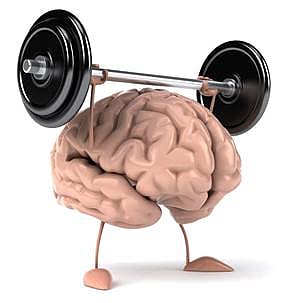By focusing or stressing on particular emotions of wishes, we end up making the ‘muscles’ stronger or weaker in the brain, says Dr SHRIRANG BAKHLE.
There are so many students in a class but only some of them have an intense determination to succeed in the exam. They will work long hours and they are willing to sacrifice many pleasures for the sake of success and they succeed! What is the difference between them and the other students? How did they become like this?
We also know many simple people who develop depression or develop anxiety, or become anger-prone. All of us have seen normal people who gradually develop addictions. There are people who try to come out of their addictions. But some succeed while others don’t. What is it that causes these good or bad changes in the people?
It all depends on the ‘muscles’ of the mind! ‘Muscles’ of the mind? Let us see what this means. All of us are born with a standard set of muscles. Some persons decide to exercise their muscles while some people do hard manual labour. This results in stronger and bigger muscles. On the other hand, if muscles are not used for a few weeks, they become weak and thin. For example, if you put your forearm in a plaster cast, within a few weeks the muscles become weak.
What about the ‘muscles’ of the mind? The mind is created in the brain. There are different brain circuits for different mind functions such as emotions and wishes. They are the equivalent of the body muscles. When we exercise these muscles, the circuits become stronger. They start responding more quickly and intensely. If you practice mathematics more, the circuits involved will become more efficient and they will respond more quickly and precisely.
It has been found that, sometimes, the brain part involved actually becomes bigger, just like the body’s muscles. In a study of taxi drivers in London, it was found that they have a bigger Hippocampus, a part of the brain – as compared to normal people. This was simply because they used to this part more often. This phenomenon is called ‘neuroplasticity’. It means that if we use those more often, the wiring circuits and cells actually become stronger. What’s the use of this knowledge? It helps to understand the different examples given at the beginning of the article. Why some people develop intense determination? How normal people become depressed, anxious or anger-prone? Why some people develop addictions and how some people are able to overcome their addictions, while others are not?
The basic determining factor is how often you use a particular mind function. If a sportsperson thinks more often about excelling in the particular sport, the wish becomes stronger. Whereas, if she doesn’t think more about ‘wish to watch movies’, that wish ‘muscle’ will become weaker!
This sportsperson is getting ready to go for practice and a friend calls saying, “let’s go for a movie”. Which wish will win, the ‘wish to practise’ or the ‘wish to go to the movie’? The ‘wish to practise’ has more ‘muscle’, so it will win.
The development of addictions and the battle to come out of the addictions are a constant tug-of-war. This is true for the ‘chemical’ addictions (such as alcohol and nicotine addictions), but other addictions such as internet addiction or gambling addiction.
A non-addict person starts thinking more and more about the wish to indulge in the addiction. In effect, she is exercising that ‘muscle’ of the mind. Over a period of time, this wish becomes stronger and more intense as compared to other ‘normal’ wishes such as ‘wish to maintain good health’, ‘wish to enjoy good relationships’ and the ‘wish to work’. Then, in the tug-of-war between the ‘addiction wish’ and the normal wishes, the addiction wish keeps winning and becomes stronger. Thus the person gets deeper into the addiction.
When a person wants to come out of addiction, she should make the normal wishes stronger by thinking about them more often and at the same time, make the addiction wish weaker by thinking less about it. If a wish is not recalled for a long time, it becomes weaker. Then the normal wishes start winning the tug-of-war and finally the person comes out of the addiction.
The same principle is applied for the ‘emotion muscles’ of the mind. If a person tries to remain happy for a long time, that brain circuit will become stronger. If she becomes angry or sad or fearful more often, those emotion centres will become stronger. By remembering and using this principle, we can make different wish or emotion ‘muscles’ stronger or weaker to our advantage.




